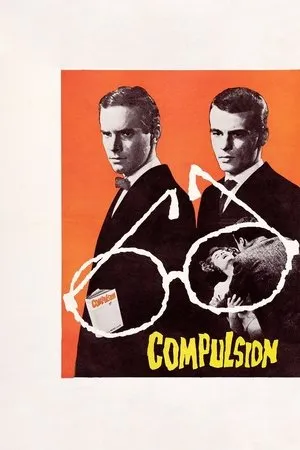Richard Fleischer’s 1959 film “Compulsion” is a gripping exploration of arrogance, intellectual hubris, and the fallibility of human planning. Based on the Leopold and Loeb case, the film delves into the twisted minds of two wealthy, intelligent young men who believe they can commit the perfect crime. Their motivation isn’t financial gain or personal vendetta, but rather a perverse desire to prove their intellectual superiority over society and the criminal justice system. The film opens with the aftermath of a heinous crime, the kidnapping and murder of a young boy. The police are baffled, with little to no leads. However, a crucial piece of evidence is discovered at the crime scene: a pair of eyeglasses. This seemingly insignificant detail becomes the linchpin in unraveling the meticulously planned crime. As the investigation intensifies, suspicion falls upon two close friends, Judd Steiner and Artie Strauss, played with chilling precision by Dean Stockwell and Bradford Dillman, respectively. Judd, the more dominant and manipulative of the two, is the mastermind behind the crime, while Artie, insecure and eager to please, is his willing accomplice. Their relationship is a complex blend of intellectual camaraderie and psychological manipulation, with Judd exerting a Svengali-like influence over Artie. Orson Welles delivers a powerful performance as Jonathan Wilk, a renowned defense attorney who takes on the seemingly impossible task of defending the two young men. Wilk is a staunch opponent of the death penalty and believes that even the most heinous criminals deserve a fair trial and a chance at redemption. His presence adds a layer of moral complexity to the film, forcing the audience to confront uncomfortable questions about justice, punishment, and the nature of evil. The film masterfully builds suspense as the police close in on Judd and Artie. The tension is palpable as the two friends struggle to maintain their composure and conceal their guilt. The screenplay is sharp and intelligent, delving into the psychological motivations of the characters and exploring the themes of arrogance, control, and the consequences of one’s actions. “Compulsion” is not just a crime thriller; it’s a thought-provoking exploration of the human psyche. It examines the dark side of human nature, the dangers of intellectual arrogance, and the importance of empathy and understanding. The film’s ending is both tragic and unsettling, leaving the audience to ponder the complexities of the case and the motivations of the characters long after the credits roll. The film serves as a cautionary tale about the dangers of unchecked ambition and the importance of humility. It reminds us that even the most brilliant minds are capable of making terrible mistakes and that no one is above the law. “Compulsion” remains a relevant and compelling film, offering a chilling glimpse into the minds of those who believe they are above the rules and the devastating consequences of their actions. Welovecinema.top highly recommends this movie.

Compulsion (1959)
In 1959's "Compulsion," two intellectually arrogant friends hatch a plan to commit the perfect crime, driven by a sense of superiority and a desire to prove their intelligence. Their meticulously crafted scheme begins to unravel when a critical piece of evidence – a pair of glasses – is carelessly left at the scene. This oversight triggers a relentless investigation, exposing their carefully constructed facade and leading to their ultimate downfall.











